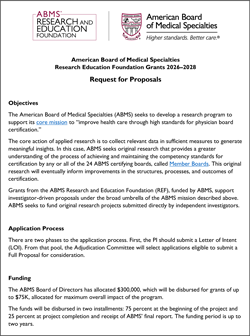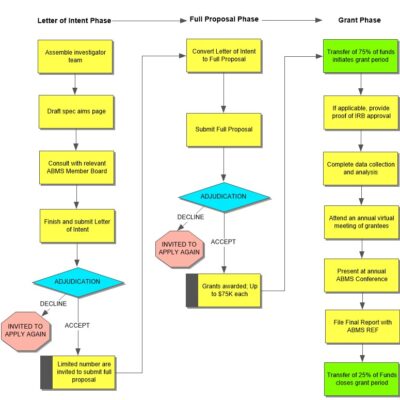Grant Opportunities
ABMS Research and Education Foundation
The Letters of Intent application period has closed. Acceptance notifications will be sent by February 27, 2026.
The American Board of Medical Specialties Research and Education Foundation™ (ABMS REF) announced grants totaling $300,000 in June 2025 that were disbursed in amounts of up to $75,000. Meet the 2025–2027 cohort and read about their research projects.
The ABMS REF is interested in original research that provides insight and informs improvements in the structures, processes, and outcomes of medical specialty certification.
Research projects may span the full range of the ABMS mission and are not limited to any one area or topic. Guidance for developing research topics (e.g., the impact of board certification on public health and health care disparities; assessing and improving equity in assessment) is included in the request for proposals.
Grant Resources
For more information on the application process:
- Download the Request for ProposalPDF
- Watch a recording of the Dec. 16 webinar
- Download webinar presentation slidesPDF
Application Process
There are two phases to the application process. First, the principal investigator (PI) should submit a Letter of Intent (LOI). From that pool, the Adjudication Committee will select applications eligible to submit a Full Proposal for consideration. Carefully review the Request for Proposal for details related to the application process.
Key Dates:
Application Period Opens: Monday, Nov. 17, 2025
Informational Webinar: Tuesday, Dec. 16, 2025
LOI Submission Deadline: Friday, Jan. 30, 2026
LOI Notifications: Friday, Feb. 27, 2026
Full Proposal Submission Deadline: Friday, May 1, 2026
Full Proposal Notification: Friday, June 19, 2026
Grant Start Date: Monday, Aug. 31, 2026
End of Grant Period: Thursday, Aug. 31, 2028
Click image to expand to full size, or view on page 3 of the Request for Proposals[PDF]
Eligibility [read more ... ]
The ABMS REF welcomes applications from health systems, universities, or other organizations with missions that intersect meaningfully with the ABMS mission. The PI’s primary position must be at a United States institution. Current and former ABMS Scholars are encouraged to apply.
The PI must not be affiliated with ABMS, which means they satisfy the following criteria:
- Neither they nor any family member receives compensation, benefits, or any form of renumeration from ABMS or an ABMS Member Board.
- They do not work for an organization that is affiliated with ABMS or ABMS Member Boards; grant funds are paid to the unaffiliated organization.
ABMS Member Boards may apply for funding only in collaboration with a PI who is not ABMS-affiliated.
Investigators who are affiliated with societies or other organizations (e.g., Accreditation Council for Graduate Medical Education, American Association of Medical Colleges) are eligible in most cases. To confirm eligibility, please contact the ABMS REF.
Member Board Contact [read more ... ]
The ABMS REF grant aims to stimulate research collaborations with and among the ABMS Member Boards. At the Letter of Intent (LOI) stage, the investigators should notify a representative from the most relevant ABMS Member Board(s) of their intended proposal. The list of primary contacts from each Member Board is included in the appendices of the Request for Proposal.
Projects that are relevant to more than one Member Board are encouraged. The investigators can incorporate feedback from this conversation into the LOI at their discretion.
The optimal timing for the Member Board consultation is after the research team is assembled and draft research objectives are developed but before completing the LOI. At the full proposal stage, the Member Board may continue to play a consultative role. This arrangement allows full independence for the investigator to put forth novel and ground-breaking ideas while benefiting from the Member Board’s deep experience with certification.
Adjudication [read more ... ]
The applications will be peer-reviewed by an advisory group of senior researchers drawn from the broader health professions education-research community and will have patient representation. Conflict of interest will be managed to ensure unbiased adjudication.
Applications will be reviewed and assessed according to the following areas:
- Relevance to the ABMS mission
- Novelty and importance of the research conceptualization and question
- Research methods
- Research team
- Potential significance
Priority will be given to proposals that demonstrate relevance to more than one of the ABMS Member Boards. PIs should outline this relevance in the “Significance” portion of the Abstract (see the Application Formats section below).
Application Format [read more ... ]
There are two phases to the application process. First, applicants should submit a Letter of Intent (LOI). From that pool, the Adjudication Committee will select applications eligible to submit a Full Proposal for consideration.
- The LOI will be no more than three pages plus supplementary materials.
- The Full Proposal, for those invited to submit one, should be no more than 10 pages plus supplementary materials.
Details can be found in the Request for Proposal. The application web portal opens on November 17, 2025.
Grant Recipient Responsibilities [read more ... ]
At the onset, the grant recipient must submit proof of Internal Review Board approval (if necessary) within three months after the start of the grant. Additionally, the recipient must:
- Be a responsible steward of ABMS funding
- Be in full compliance with institutional ethics and conflict of interest procedures
- Attend a virtual meeting of grantees held annually
- Submit a final report to ABMS
- Present study findings at the annual ABMS Conference in September, following the end of the grant period
- Submit findings for peer-reviewed publication in a timely fashion
In addition to the research insights achieved by the individual grantees, another key objective of the grant program is to facilitate a community of research practice around the mechanism of certification. This community will be achieved through a judicious number of grantee interactions with each other, with ABMS Member Boards, and with current ABMS Scholars Program participants.
Frequently Asked Questions [read more ... ]
Project Scope and Requirements
Q: Does the grant program treat program evaluation and research differently?
A: Yes. Research and program evaluation are both structured ways to study something, but they have different goals. Research is meant to create new knowledge that applies broadly, while program evaluation looks at how well a specific program or policy works, usually to improve it locally. The ABMS REF grant program supports both but prefers evaluations that offer insights beyond just the local setting.
Q: Will investigators be able to access ABMS or Member Board data?
A: Possibly. Access to ABMS and Member Board data is determined on a case-by-case basis and governed by institutional Data Use Agreements. Investigators are encouraged to consult with relevant boards early in the process to explore data-sharing opportunities. If access to Member Board data is essential for the proposed research, approval must be obtained before submitting the grant application—or at minimum, before funds are distributed if the grant is awarded.
Q: Are certain research methods preferred by the ABMS REF?
A: No specific methods are preferred. The emphasis is on the strength of the research question and the appropriateness of the methods used to address it. The REF anticipates a diverse portfolio of methodologies and assembles its adjudication committee accordingly.
Eligibility and Roles
Q: Can an individual serve as a Principal Investigator (PI) if they previously received a grant from an ABMS Member Board?
A: Yes, individuals who previously received funding from an ABMS Member Board are eligible to serve as PIs for ABMS REF grants; there are no permanent exclusions based on past award status. As long as the applicant meets the current eligibility criteria, they may apply and be considered for funding.
Q: Why does the ABMS REF prioritize research from independent investigators?
A: The ABMS REF promotes independent research to ensure trust and objectivity in findings. This approach stems from the recommendations of the ABMS “Vision for the Future Commission,” which emphasized the importance of unbiased research in evaluating the value of continuing certification. Independent investigators—those unaffiliated with ABMS or its Member Boards—are seen as best positioned to conduct impartial studies that can inform certification practices.
Q: Does affiliation with an institution connected to an ABMS Member Board affect PI eligibility?
A: It depends. If the PI is a paid employee or holds a funded role within an ABMS Member Board or a directly affiliated organization, they are not considered independent and may be ineligible for certain grant themes. The REF seeks to avoid any appearance of bias and encourages applications from investigators who are structurally independent from ABMS and its Member Boards.
Q: Can a grant application include multiple Principal Investigators (multi-PI)?
A: Yes. Multi-PI applications are allowed, provided the roles and responsibilities of each investigator are clearly defined. The application should explain how accountability will be maintained, especially in the event that one investigator leaves the institution. A history of collaboration among the investigators can strengthen the proposal.
Budget and Funding
Q: Are there salary caps for investigators?
A: The ABMS REF does not impose a fixed salary cap. However, the proposed budget should be reasonable and justified within the overall grant request. Budget details will be reviewed during the contracting phase. For specific concerns, applicants are encouraged to contact the ABMS REF.
Q: Are indirect costs reimbursed?
A: Yes. The grant program allows up to 10% of the total budget to be allocated for indirect costs related to institutional grant administration. For example, a $75,000 grant may include $68,000 in direct costs and $6,800 in indirect costs.
Q: Can grant funds be used to develop commercial products or services?
A: No. The ABMS REF grant program is intended to support research aligned with the ABMS mission—not product development. While successful research may eventually inform educational applications, the grant itself should not be used to create commercial offerings.
Application Materials

For more information on the application process, download the Request for Proposal[PDF] and watch the recording of our recent informational webinar!
Questions?
If you have any questions about the grant program, please contact the ABMS REF.

